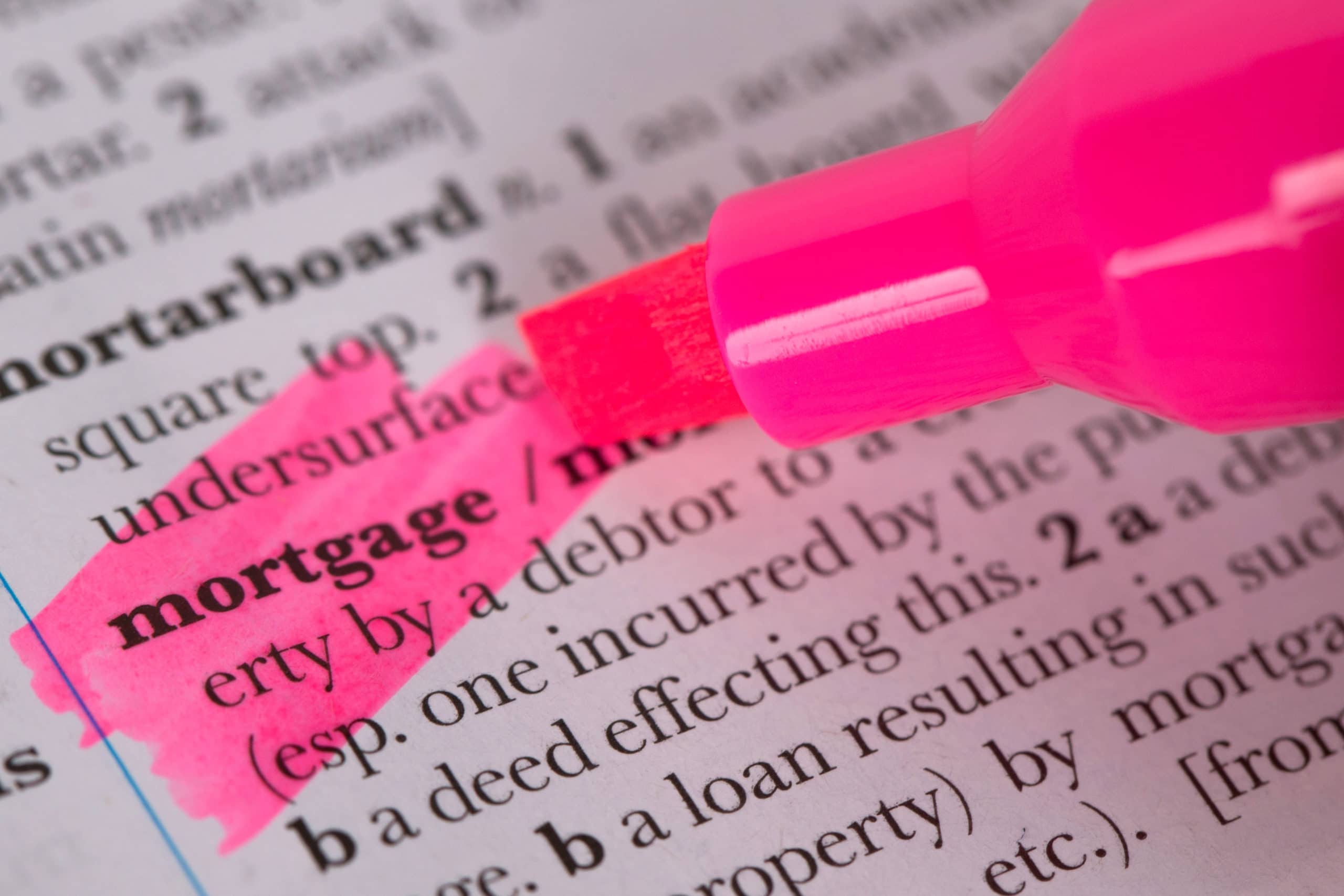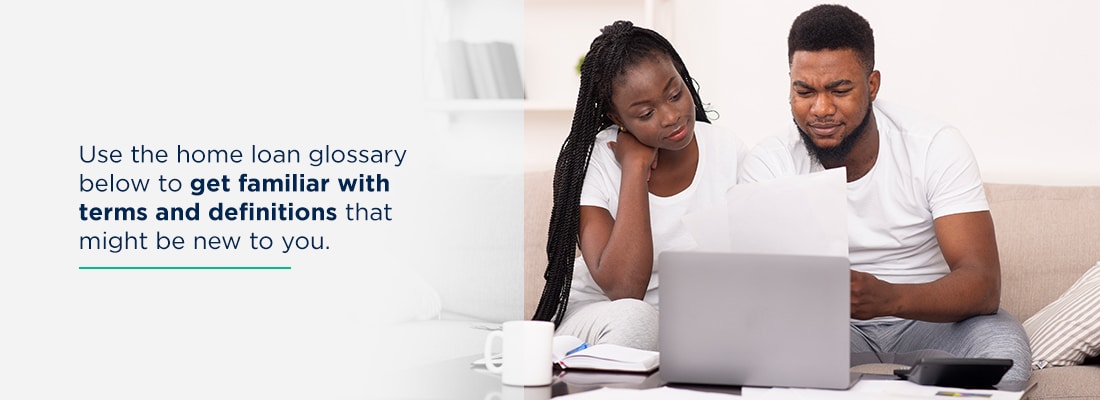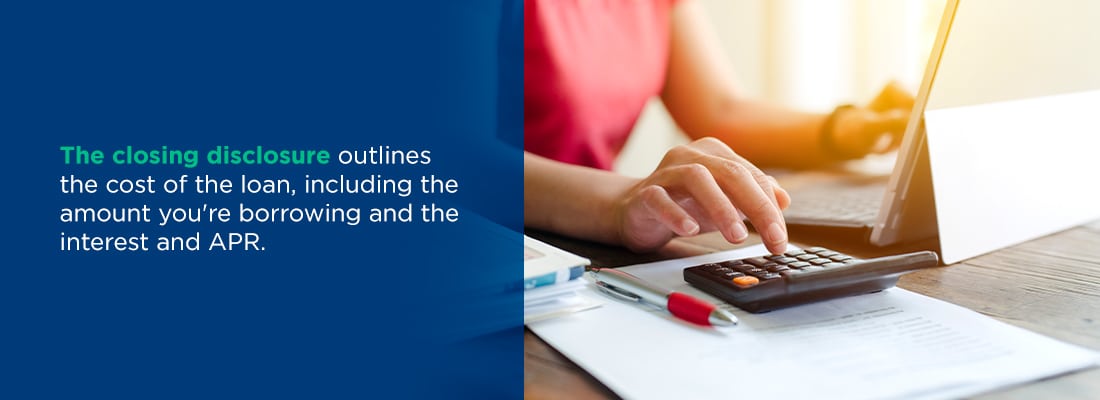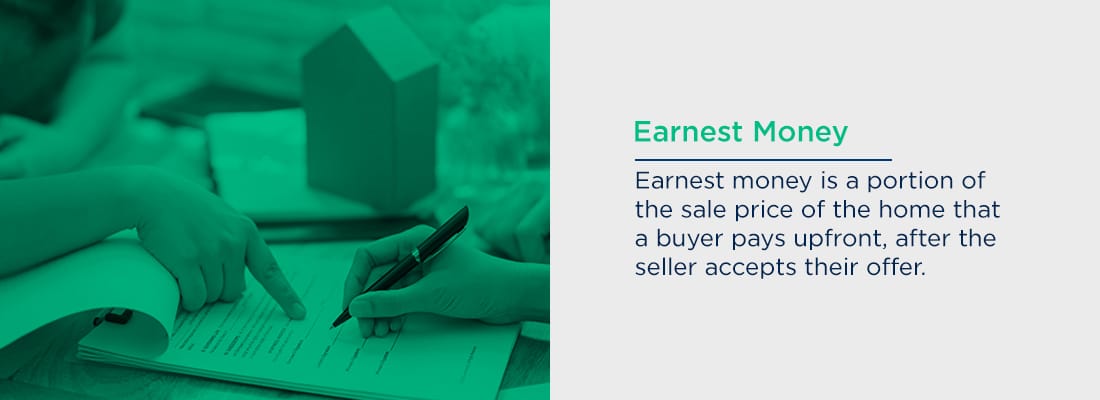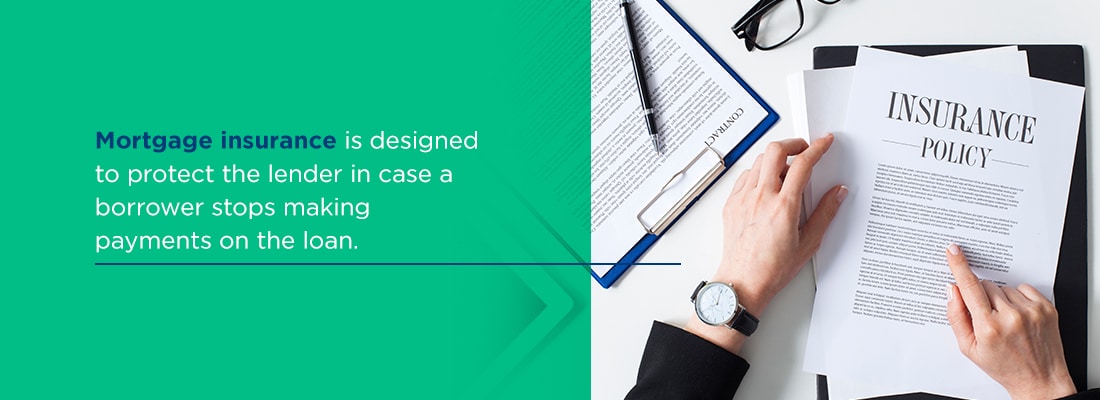If you plan to buy a home or refinance an existing mortgage, you’ll likely encounter mortgage loan terms and definitions that may be unfamiliar — especially if you’re buying a house for the first time. Our mortgage glossary can help you better understand the terminology you’re likely to hear or read as you go through the loan application and homebuying process.
Table of Contents
Use the home loan glossary below to get familiar with terms and definitions that might be new to you. As you go through the process of buying your home or refinancing a home loan, you can also ask your mortgage lender to explain any terms or phrases that are unclear to you.
Adjustable-Rate Mortgage (ARM)
An adjustable-rate mortgage has an interest rate that can change over the term of the loan. Often, the mortgage has an introductory rate that lasts for a defined period, such as five years. After the introductory period ends, the rate adjusts based on the market rate on a set schedule. You might see an adjustable-rate mortgage written as 5/1 or 7/1. The first number refers to the length of the introductory period, while the second is how often the rate can adjust.
Amortization
Amortization is the process of paying off a loan over a set period. As you make payments on the loan, the principal decreases, meaning the amount you owe drops. If you have a loan that amortizes, once you have made all the payments, you won’t owe anything on the mortgage anymore.
Annual Percentage Rate (APR)
The annual percentage rate is the cost of taking out the loan. It includes the interest rate charged on the mortgage as well as any fees, such as origination fees and closing costs. The APR is shown as a percentage rate and needs to be included on your closing disclosure.
Appraisal
Before you buy a home or refinance a mortgage, your property will most likely need to go through the appraisal process. During an appraisal, a professional will evaluate your home’s condition, how much similar homes have sold for recently and the overall market to determine the value of your home. The appraisal can be more than the price of the house or it can be less. If the property appraises for less than you are trying to borrow, there is a chance your mortgage will fall through.
Assessed Value
The assessed value of your home is how much it is worth in the eyes of the tax agency in your municipality. The assessed value is used to calculate your property taxes. It can be less than the market or appraised value of your home.
Balloon Loan
A balloon loan doesn’t fully amortize over the term of the mortgage. If you have a balloon loan, you can expect to have one large, or “balloon,” payment due at the end of the term. With a balloon loan, you still make monthly payments during the term, but they tend to be small and aren’t enough to pay down the principal fully.
Base Rate
A base rate is the interest rate used as a reference point when setting the rate for an ARM or another loan with a variable rate.
Cash to Close
Cash to close is the amount of money you need to bring with you to closing. Your cash-to-close amount will include the closing costs and the down payment. The closing disclosure you receive a few days before you close will let you know how much you need to bring. You don’t have to bring actual cash with you. A certified check or wire transfer is also permitted.
Certificate of Eligibility
If you are interested in a VA loan, your certificate of eligibility will verify that you are eligible for the loan. The federal government issues the certificate.
Closing Costs
Closing costs are the fees you pay to the lender to finalize the mortgage in addition to transfer fees paid to your local government, appraisal fees, attorney’s fees and title report fees. The exact amount of your closing costs depends on where you are buying and the value of your home.
Closing Disclosure
Your lender will provide the closing disclosure three business days before your closing date. The closing disclosure outlines the cost of the loan, including the amount you’re borrowing and the interest and APR. It also details the costs you’ll need to pay at closing. It’s important to review the disclosure before closing to make sure there are no errors or to correct issues if there are any.
Conforming Loan
A conforming loan meets the requirements set by Freddie Mac and Fannie Mae, two government-sponsored organizations that buy mortgages. The limit for a conforming mortgage varies by area, based on the cost of housing. A mortgage that is above the limit is known as a non-conforming or jumbo loan.
Credit Score
A credit score is a three-digit number that gives a lender an idea of your credit history and the likelihood that you will repay your loan. Several different methods exist for calculating credit scores, and they usually range from 300 to 850. Factors that affect a credit score include the length of credit history, repayment history, variety of credit, amount of credit and your activity, such as applying for credit cards and loans.
Default
Default occurs when a person stops making payments on their mortgage or is otherwise unable to keep up with the terms of the loan — for example, making partial payments instead of the total amount due each month. Defaulting on a mortgage can cause your credit score to drop. If you don’t resume payments or bring the account current, you could lose your home through foreclosure.
Down Payment
The down payment is a portion of the price of the home that you pay upfront. Although 20% is considered the “gold standard” down payment to make, you can get a mortgage and buy a home putting down a smaller amount, in some cases, as little as 3%. The bigger your down payment, the lower the cost of your mortgage.
Earnest Money
Earnest money is a portion of the sale price of the home that a buyer pays upfront, after the seller accepts their offer. The deposit shows that a buyer is serious and allows the seller to take the home off the market. If the buyer backs out of the sale, the seller gets to keep the earnest money. If the sale falls through because of the seller or because of an agreed-upon contingency, the buyer gets the earnest money back.
Equity
Equity is the difference between a home’s value and the amount a person owes on the mortgage. As homeowners pay down the mortgage principal, they can leverage their equity by borrowing against it.
Escrow
A lender might set up an escrow account where they hold money that goes toward your property tax payments and homeowners insurance premiums. Each month, your mortgage payment includes an amount that goes into escrow. When insurance or property taxes are due, the lender pays the insurance company or government with funds from your escrow account.
Fair Market Value
Fair market value is how much your home is likely to sell for if you put it on the market. The fair market value might be the same as appraised value, but it might also be higher.
Federal Housing Administration
The Federal Housing Administration (FHA) is a government agency created to guarantee mortgages and help people who don’t qualify for other types of mortgages to buy a home. Under the FHA loan program, the agency guarantees loans made by private lenders, offering to pay the loans if the borrower defaults. People who take out FHA loans need to pay an upfront mortgage insurance premium as well as a mortgage insurance premium for the life of the loan.
Fixed-Rate Mortgage
A fixed-rate mortgage has an interest rate that remains the same for the entire term of the loan. With a fixed-rate home loan, you can lock in a low rate when interest rates are low. If you buy when rates are higher, you might refinance later if rates drop.
Foreclosure
If a borrower stops making payments on the mortgage, the lender can foreclose on the loan, meaning the lender takes control of the property. During the foreclosure process, the lender will try to gain back the balance owed on the loan, often by selling the property.
Good Faith Estimate
A good faith estimate is a form a lender provides when a person applies for a mortgage or reverse mortgage. It provides a detailed list of the costs that might be connected to the loan.
Home Inspection
A home inspection is a visual inspection of the property that is often part of the homebuying process. The inspection can make the buyer aware of potential issues in a home. A buyer can use the information gleaned from the inspection to negotiate with the seller. Depending on the results of the inspection, a buyer can walk away from the property, the seller can offer to fix things or everything can proceed as normal.
Homeowners Insurance
If you have a mortgage, you will most likely have to get homeowners insurance, which provides coverage if the home is damaged by a storm or fire. Insurance also protects you against theft. You can purchase add-ons to your homeowners insurance coverage if you own a lot of jewelry or other high-value items or if your home is located in a flood plain.
Interest-Only Loan
With an interest-only loan, your payments only cover the cost of interest, at least for a few years. The principal balance remains the same. An interest-only loan can mean that you have a low monthly payment, at least for the first part of your repayment term. Since they are high-risk, it can be difficult to find lenders that offer interest-only loans.
Interest Rate
While the APR is the total cost of the loan, the interest rate is the annual cost. Usually, it is expressed as a percentage.
Jumbo Loan
A jumbo loan, or non-conforming loan, is a mortgage that has a value that is above the conforming limits Fannie Mae and Freddie Mac set. Jumbo loans usually cost more to the borrower than conforming loans and are often more difficult to qualify for.
Lien
A lien is a claim on a property, usually placed by a lender or creditor as a type of security in case a borrower defaults. When you have a mortgage, the lender puts a lien on the property. In some cases, liens can interfere with the sale of a home, which is why a title search and title insurance are often part of the sale process.
Mortgage Insurance
Mortgage insurance is designed to protect the lender in case a borrower stops making payments on the loan. People who put less than 20% down when buying a home usually have to purchase private mortgage insurance and need to make premium payments until they have paid down at least 20% of the value of the home.
Negative Amortization
When a mortgage has negative amortization, the monthly payments aren’t sufficient enough to pay off the interest owed. The remaining interest gets added to the principal balance, making it possible for the amount owed to increase.
No-Closing-Cost Loan
A no-closing-cost loan displaces the closing costs, it doesn’t eliminate them. Instead of paying upfront during closing, the closing costs are rolled into the loan. The lender might add the costs to the loan’s principal or they might charge a slightly higher interest rate.
Owner Financing
Owner financing means that the seller of the home is offering a loan to the buyer, not a traditional bank or lender. The seller might offer to finance the entire purchase or offer partial financing.
Points
Points refer to an amount the buyer pays the lender at closing to reduce the interest rate. They are sometimes called mortgage points or discount points. Essentially, they are a way to prepay interest.
Preapproval
The preapproval process gives you an idea of how much a lender will let you borrow and what your interest rate will be. If you go through preapproval, you’ll get a letter from the lender verifying they have reviewed your financial details and that they are likely to let you get a mortgage.
Prepayment
If you pay more on your mortgage than the required monthly payment, you are making a prepayment. Some, but not many, mortgages charge a prepayment penalty, meaning you might have to pay a fee if you make higher than the minimum payment. Prepayment can reduce the total cost of your mortgage and allow you to own your home outright sooner.
Prequalification
Prequalification is an early estimate of the amount you can borrow or if you’d be approved for a mortgage. It’s less formal than a preapproval and doesn’t represent a commitment by the lender. It can be a good starting point to see if buying a home is a possibility.
[download_section]
Principal
The principal is the amount of money you’ve borrowed and owe on your mortgage. As you make payments, some of the payment goes toward the principal each month, lowering the amount you owe. If you pay extra on your mortgage, you can designate the additional payment to go toward the principal to speed up the time it takes to pay off your loan.
Rate Lock
When a lender makes you an initial offer to lend, they will also likely give you a rate lock, meaning the rate offered won’t change between the day of the offer and the day of closing. A rate lock helps you avoid paying a higher than expected interest rate or APR on your mortgage.
Refinance
When you refinance, you take out a second mortgage and use the proceeds from it to pay off your initial home loan. You can refinance for a variety of reasons, such as reducing your interest rate, shortening the term of your loan or getting cash for another project. During the refinancing process, your home will most likely be appraised again and you’ll need to go through the closing process again.
Seller Concessions
One way to reduce your closing costs is to get the seller to agree to seller concessions, or paying some of the costs. You can ask a seller to pay a percentage of the closing costs or to cover specific costs. Depending on the market, some sellers might offer concessions upfront to make their property more desirable.
Term
The term of a mortgage refers to its duration. The most common mortgage term is 30 years, but 15-year mortgages are also fairly common. It’s also possible to get a 10-year or 20-year mortgage. The longer the term of a mortgage, the lower your monthly payment, but the more you’ll pay in interest over the length of the loan. Shorter-term mortgages also usually have lower interest rates.
Title
The title of a home is a record of who has owned it. Before you buy a property, it’s essential you make sure it has a free and clear title. If someone else has claim to the title, they could step in and interfere with the sale or complicate things after closing. To prevent title disputes, most lenders will require you to buy title insurance and to have a title check completed before closing.
Title Insurance
Title insurance protects the lender or the buyer of a property from claims on the title of a home after the sale. It’s usually required before you get a mortgage.
Underwriting
When a lender reviews your credit, checks your bank accounts and otherwise looks into your employment and financial history, they’re performing underwriting. The underwriting process is a critical part of the mortgage approval process. It allows a lender to finalize the amount of your loan and the interest rate charged. If anything unusual comes up during the underwriting process, a lender might decide not to give you a mortgage.
USDA Loan
A USDA loan is a mortgage either directly from the U.S. Department of Agriculture (USDA) or guaranteed by the USDA. The mortgages are designed to help people buy properties in rural or suburban areas.
VA Loan
VA loans are guaranteed by the Department of Veterans Affairs. They are designed to help people who are veterans or are currently serving in the armed forces to purchase a home. VA loans offer up to 100% financing, meaning a person who is eligible for the mortgage can secure a loan without a down payment.
Walk-Through
A walk-through is the last inspection of a home, made right before closing. During it, the buyer can verify that the seller has made any repairs agreed upon and that the home is otherwise in the same condition it was in when the buyer made their offer.
Wire Transfer
A wire transfer is a way to send money from one bank account to another electronically. It’s an option for paying for closing costs during settlement.
Apply for a Mortgage in Just 15 Minutes With Assurance Financial
Knowing the definition of commonly used mortgage terms can help you through the homebuying process. If you’re ready to get started buying your home or refinancing an existing home, Assurance Financial can help. Apply online today or find a loan officer near you.
Linked:
- https://assurancemortgage.com/what-is-an-amortization-schedule/
- https://www.consumerfinance.gov/owning-a-home/closing-disclosure/
- https://assurancemortgage.com/jumbo-loan-vs-conforming-loan/
- https://assurancemortgage.com/how-to-build-credit-to-get-loan/
- https://assurancemortgage.com/what-to-expect-closing-day/
- https://assurancemortgage.com/what-to-expect-during-a-home-inspection/
- https://assurancemortgage.com/why-get-pre-qualified-before-looking-for-home/
- https://assurancemortgage.com/everything-you-need-to-know-about-30-year-fixed-rate-mortgages/
- https://assurancemortgage.com/15-year-fixed-mortgage-rate/
- https://assurancemortgage.com/usda-loans/
- https://assurancemortgage.com/va-loans/
- https://assurancemortgage.com/apply/
- https://assurancemortgage.com/find-a-loan-officer/

